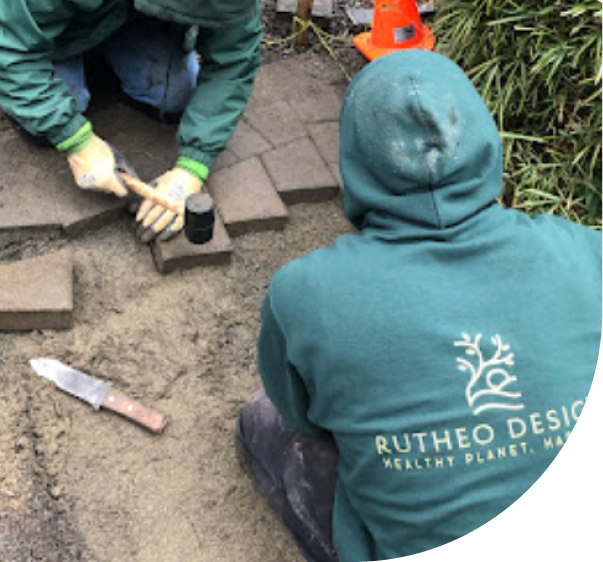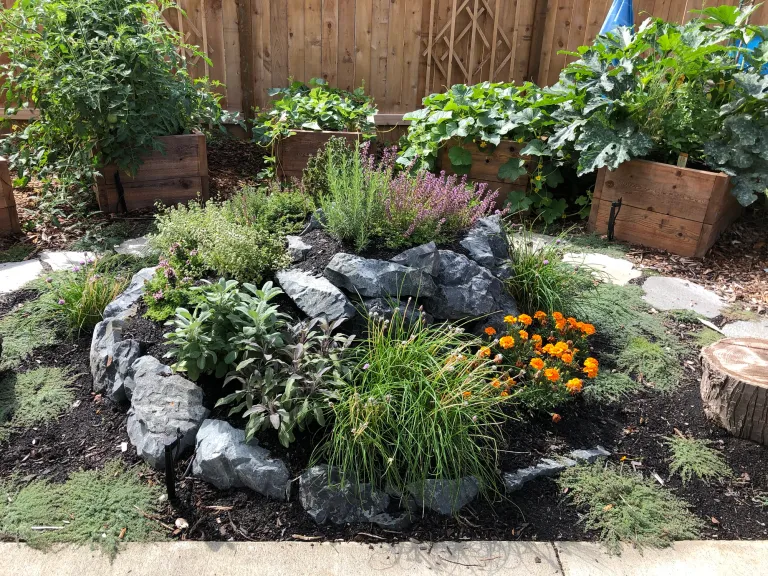
At Rutheo Designs, we prioritize sustainable hardscape materials and eco-friendly products that blend seamlessly with Seattle’s natural environment while supporting environmentally conscious practices. Our approach emphasizes the use of recycled, reclaimed, and renewable materials to create hardscapes that are both durable and environmentally responsible. By incorporating eco-friendly products such as permeable pavers, rainwater harvesting systems, biodegradable erosion control mats, locally sourced stone, and reclaimed wood, we help reduce the environmental impact of landscaping projects. These materials and products not only minimize waste and conserve resources but also enhance water management, a critical factor in the Pacific Northwest’s rainy climate. Through thoughtful design, we integrate hardscape elements with surrounding greenery, promoting biodiversity and creating outdoor spaces that are functional, beautiful, and sustainable.
Sustainable hardscape materials are those that minimize environmental impact through their production, use, and disposal. This includes using recycled or reclaimed materials, locally sourced resources, and options with a long lifespan to reduce waste. Sustainable hardscaping emphasizes renewable resources and practices that lower energy consumption, conserve water, and integrate with natural ecosystems.
Eco-friendly hardscaping reduces the carbon footprint of outdoor spaces while improving environmental outcomes. For example, permeable paving materials help manage stormwater runoff, reducing strain on municipal systems and preventing soil erosion. Using reclaimed materials reduces demand for new resource extraction, which helps preserve natural habitats.
Sustainable materials offer both durability and visual appeal. Thoughtful selection ensures hardscape elements are functional, weather-resistant, and align with the design’s aesthetics. Materials like natural stone and composite decking balance beauty with resilience, making them ideal for long-lasting landscapes.
Reclaimed wood offers a rustic, timeless look while reducing waste. It can be used for decking, fencing, and decorative elements. Treated properly, it withstands Seattle’s wet climate while maintaining its natural charm.
Recycled concrete and bricks are highly durable, making them ideal for patios, pathways, and retaining walls. Their use minimizes construction waste and offers a cost-effective alternative to new materials.
Repurposed metal, such as old steel panels or wrought iron, can be transformed into fences, gates, or accents. It’s a versatile, long-lasting material that adds industrial charm while promoting reuse.
Permeable pavers allow water to filter through the surface, reducing runoff and aiding groundwater recharge. This feature is particularly valuable in Seattle, where managing rainfall effectively is critical.
Options include gravel, porous asphalt, and permeable concrete. Each offers distinct benefits in terms of aesthetics, durability, and cost, catering to various project needs.
Proper installation ensures long-term performance. This includes preparing a stable base, ensuring proper drainage, and using materials suited to Seattle’s wet conditions.
Locally sourced stone reduces transportation emissions and supports regional suppliers. Materials like basalt and granite are plentiful in the Seattle area, making them excellent sustainable choices.
These stones offer unmatched durability and natural beauty. Flagstone is ideal for pathways, while granite and basalt are perfect for retaining walls and patios.
Strategic use of natural stone enhances both functionality and aesthetics, creating timeless, sustainable outdoor spaces.
Bamboo grows quickly and regenerates naturally, making it one of the most renewable building materials available. It’s strong, lightweight, and versatile.
Bamboo outperforms many traditional woods in sustainability while offering comparable strength and beauty. It’s an excellent alternative for eco-conscious projects.
Proper sealing and regular maintenance are essential to prevent water damage and extend bamboo’s lifespan in damp conditions.
Composite materials combine recycled plastic with wood fibers, creating durable, low-maintenance options for decks and patios. They’re resistant to rot, warping, and insects.
Bio-based resins are made from renewable materials like soybean or corn. They’re environmentally friendly but may have higher upfront costs compared to traditional options.
Composite materials require minimal upkeep, making them ideal for homeowners seeking durability with little maintenance effort.
Permeable surfaces, such as porous pavers and gravel, allow rainwater to seep into the ground rather than contributing to surface runoff. These materials reduce pressure on Seattle’s stormwater systems while replenishing groundwater reserves. Proper placement and grading ensure maximum effectiveness, even during heavy rainfall.
Rain gardens and bioswales are natural solutions for managing water flow. They can be integrated alongside pathways, driveways, and patios to direct water efficiently while filtering out pollutants. By pairing these features with sustainable hardscapes, we create landscapes that thrive under Seattle’s rainy conditions.
Gravel and river rock serve as functional and aesthetic elements in hardscaping. They can be used to direct water away from foundations or to create dry creek beds that handle overflow during storms. These materials are durable and low-maintenance, making them ideal for sustainable landscapes.
Incorporating planters and vertical gardens adds greenery to hardscaped areas, softening the look and enhancing air quality. These features are especially useful in urban spaces where ground planting may be limited.
Designing spaces for native plants within hardscapes, such as between pavers or along borders, supports local biodiversity. Native plants are well-adapted to Seattle’s climate, requiring less maintenance and providing habitats for pollinators and other wildlife.
A balanced mix of softscape (plants) and hardscape (structures) fosters a dynamic ecosystem. This integration not only enhances aesthetics but also promotes biodiversity by creating varied habitats for flora and fauna.
Hardscape features like retaining walls with built-in seating or multi-purpose planters add functionality to outdoor spaces. These designs maximize utility while minimizing resource use, aligning with sustainable principles.
Flexibility is key in sustainable landscaping. By designing patios that double as gathering areas or fire pits that can be used year-round, we create spaces that adapt to changing needs and seasons.
Thoughtfully designed hardscapes prioritize both utility and sustainability. For example, using durable materials that require minimal upkeep reduces waste over time while meeting functional demands.

At Rutheo Designs, we are dedicated to transforming your outdoor spaces into beautiful, sustainable landscapes that reflect your vision and the unique character of the Seattle area. We offer services in native plant landscaping, water-efficient irrigation, custom landscape design, and hardscaping solutions tailored to your goals and the local environment. Every project is unique, and we take the time to listen to your needs and offer personalized solutions that align with both your aspirations and Seattle’s natural surroundings.
We invite you to reach out to us to start the conversation about your landscaping needs. You can contact us by email at connect@rutheodesigns.com or give us a call at (360) 844-2989. Whether you have specific questions or are ready to schedule a consultation, we’re eager to help you bring your outdoor vision to life with the care and expertise that Rutheo Designs is known for.